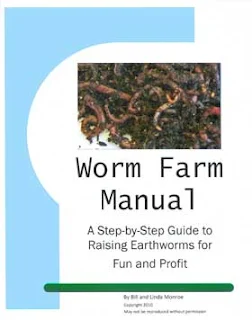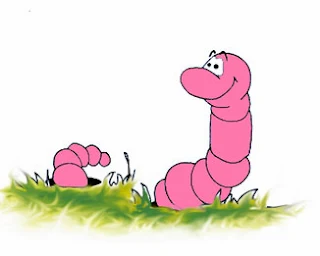 |
| This worm is in danger! |
Doing This Is A Sure-Fire Way To Kill Your Worms
Worm Handling Do's and Don'ts
Quick. What's the easiest way to kill worms? Besides poison or fire? While you think you're taking care of them?
Answer: Exposing your worms to air.
Can't tell you how many times I've heard something similar to this and I cringe every time: "I ordered 200 worms and I only got 199. I know 'cause I counted them 10 times to make sure."
Or: "I've counted my worms in my worm bed and it's got 9,314 worms. Is that too many?"
First of all, you don't need to know the exact count of your worms right down to the last individual. Unless they're cupped bait (which is generally around 24 worms and can be counted quickly), finding the exact count of worms in a bag or bed is just not that necessary.
Secondly and more importantly, the act of counting each and every worm right down to that last individual hiding under that last bit of bedding is actually very harmful to the worms and can kill them.
Why? I'll tell you why. Worms hide under bedding for a reason. The light rays hurt them and the air dries them out. Quickly. So when you meticulously pull every worm out of that bedding saying "five-hundred and eighty-seven", and then, heaven forbid, leave the poor guy lying around exposed while you continue counting, that worm is drying out immediately and the harmful light rays are sickening it immediately.
Now, the worms won't die right away except if they're left out for an extended period. But they are at risk of getting sick and you'll be wondering later, "Why are my worms crawling around aimlessly on top of the bedding?" "Why are my worms balled up in the corner." "Why are my worms smaller." "Why are my worms dead?"
Worms exposed naked to air dry out very quickly. Because they are comprised mostly of water and the water evaporates easily, you can actually see them loosing weight. You may start out with a pound of worms and by the time your done counting, you may only have half that amount. Plus, the stress on the worms is harmful and will set them back weeks in their development.
The skin of a worm is highly sensitive to light rays. The light is actually very painful, which is why leaving a light on over a bed keeps worms from crawling. Worms avoid light for a reason. When you're pulling them out of the bedding for counting (or transferring, for that matter), the worms receive harmful, burning light rays to their skin. Once again, this sets back their development and can sicken them to the point of dying.
Counting Worms
So, how are you going to get a count on the worms you have, whether you ordered a bag or you're selling a pound of worms to a customer?
If you've just received a pound of worms you ordered, weight the bag of worms. The worms were shipped at just under 2 pounds (1 pound of worms and the rest moist bedding). Taking into account the loss of moisture during transit, the bag should weight around 1 pound 8 or 10 ounces. If you dump your worms into a tray and toss the worms to evenly distribute them, you sound see an even amount of worms to bedding.
If you're serious about knowing the exact amount of worms and really want to count them, have a separate tray of bedding to toss the worm into as you pull them out of the original bedding. Throw some bedding over the worm immediately and continue counting. Limit the amount of exposure the worms have to light and air to an absolute minimum. Oh, and spritz your worms with some non-chlorinated water after you're done to replace lost moisture.
For Worm Farmers
For aspiring worm farmers, my worm farm manual has some quick and easily methods of counting your worms without actually counting every last worm. Plus a whole lot of other tips and how-to's.
My Worm Farm Manual comes in a hard-copy or digital download. Get all the information you need on worm counting and worm care in one handy manual.



